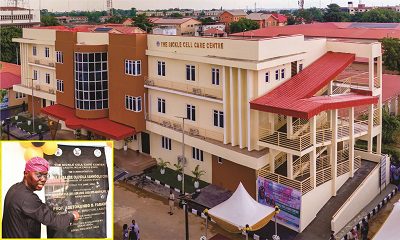
Sanwo-Olu inaugurates Paediatric Sickle Cell Centre at LASUTH
By Sodiq Adelakun
Lagos State Governor, Babajide Sanwo-Olu, has inaugurated a state-of-the-art Paediatric Sickle Cell Centre at the Lagos State University Teaching Hospital (LASUTH).
The centre, donated by the Office of the Senior Special Assistant to the President on Sustainable Development Goals (OSSAP-SDGs), aims to provide comprehensive care to children suffering from sickle cell disease.
At the inauguration, Governor Sanwo-Olu emphasized the centre’s role in providing early diagnosis, advanced treatment, and continued management to affected children.
He also highlighted the centre’s potential as a hub for research and education, promoting greater awareness and understanding of sickle cell disease.
The Paediatric Sickle Cell Centre is expected to provide relief to families affected by the condition and contribute to improved healthcare outcomes in Lagos State.
“This will not only transform our total healthcare landscape but will add to the number of childcare facilities that already exist in our state health institutions.
“It will raise the capacity of the state’s medical services and, very importantly, contribute to improving the state’s infant and maternal mortality index,” he said.
The governor noted that the centre would provide an environment where children could receive holistic care tailored to their needs, from medical treatment to psychological support.
“We believe that this will ensure that every child that has an opportunity to come to this facility will come out healthier, better, and they’ll be able to fulfil their life,” he said.
Recall that the Minister of State for Health and Social Welfare, Tunji Alausa, restated the Federal Government’s commitment to combat non-communicable diseases and improve healthcare outcomes for Nigerians.
Alausa said that sickle cell disease, alongside malaria, cancer, hypertension, diabetes, and other non-communicable diseases, represents a substantial health burden for the country, worsening morbidity and mortality of citizens.
“At the federal level, we recognise the urgent need to address these challenges and are committed to building a robust infrastructure to manage and mitigate the impact in collaboration with our subnational government.
“The establishment of this state-of-the-art Sickle Cell Centre is a testament to the dedication of the SDG office to provide quality healthcare and infrastructure to our people.
“This centre is not merely a building, it is a beacon of hope for many and a cornerstone of our strategy to enhance healthcare services nationwide,” he said.
The minister stressed the importance of leveraging the resources to its fullest potential, ensuring that it delivers on its promise to improve lives.
Mr Alausa advised subnational governments to form strategic partnerships for healthcare and human capital development, stressing that through collaboration, a resilient healthcare system capable of meeting the demand of the population would emerge.
He commended the Lagos State government and OSSAP-SDGs on their partnership to provide top-tier cancer care to children and their commitment to innovative research.
Meanwhile, the Senior Special Assistant to the President on Sustainable Development Goals, Adejoke Orelope-Adefulire said the centre is dedicated to enhancing the quality of care for children with sickle cell disease.
She highlighted that this initiative aims to reduce under-five child mortality rates and support the country’s progress toward achieving its Sustainable Development Goals (SDGs).
Speaking at the event, Chief Medical Director of LASUTH, Adetokunbo Fabamwo, emphasized Nigeria’s high prevalence of sickle cell disease, with nearly three million people affected.
He noted that the condition significantly contributes to childhood morbidity and mortality.




